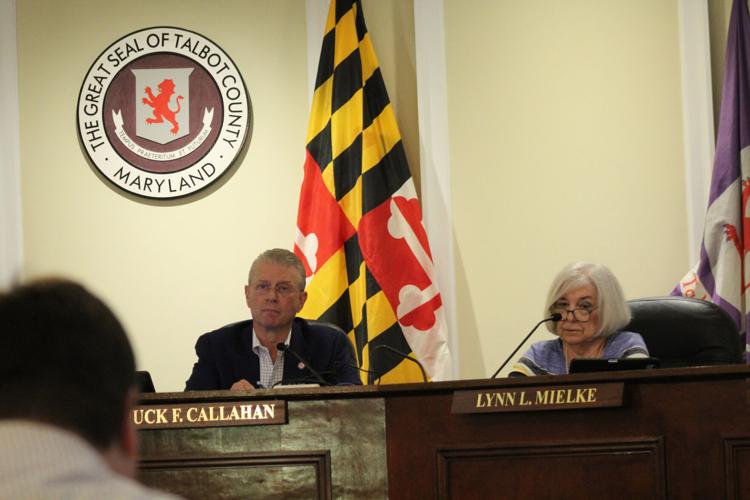EASTON — A zoning bill for cannabis facilities in Talbot County failed to pass Tuesday after months of consideration, sending the County Council back to square one.
Since recreational cannabis was legalized in Maryland in 2023, local jurisdictions have been tasked with creating zoning regulations for different types of cannabis operations. Talbot County planners have worked nearly a year on drafting a cannabis processing and growing bill, outlining rules on setbacks from homes, odor mitigation and more.
On Tuesday, council members voted down two proposed amendments to the cannabis bill and, eventually, the bill itself. Opposition from council President Chuck Callahan and member Lynn Mielke, along with abstentions from Keasha Haythe (and, in one instance, Dave Stepp), combined to defeat the legislation. Vice President Pete Lesher and Stepp supported the amendments, while Lesher was the sole yes vote on the unamended bill.
Lesher told Â鶹´«Ă˝ that he didn’t expect the bill to fail. He believes without it, the county in a tricky spot.
“I think we find ourselves in an interesting position figuring out what the course forward is on regulating cannabis,” Lesher said during the meeting. “The state has told us that we must do so, and we now don’t have a plan.”
As drafted, the legislation would have required processors and growers to locate at least 500 feet away from residential lots, mitigate cannabis odors so nothing is “detectible from adjacent properties” and obtain site plan approval from the county.
Multiple state cannabis license holders had advocated for a reduced setback and lessened odor mitigation requirements, citing that they may not be able to successfully open in Talbot County without those changes. But those edits didn’t appear in legislation on the table Tuesday.
Stepp offered an amendment to harden the 500-foot setback so it couldn’t be reduced by way of an agreement between affected neighbors, though that failed with only Lesher’s support.
Lesher offered an amendment to make permits for processors available only through special exception, as well as increase minimum lot size for growers and processors from 20 to 40 acres. Those changes were recommended by the county’s Planning Commission, but only Stepp joined the vice president in supporting them.
Council members who voted no on the legislation cited varying reasons.
Haythe said in an interview after the meeting that she needs more information and has concerns about the effects of odor on children.
“We’re gonna have to go back to the drawing board and come up with something,” Haythe said. On Wednesday, Haythe said she’s working with council and County Attorney Patrick Thomas on drafting a new bill.
In an interview, Stepp said there were “too many moving parts” with the legislation for it to pass. The residential setback should be closer to 1,000 feet, he said.
“I feel like it wasn’t the best product that we could’ve put forward yet,” Stepp said. While he still has “a hard time believing” recreational cannabis passed statewide, he acknowledged the county is in a position where it must create some sort of local zoning law.
Many residents have weighed in on the legislation. The matter gained traction in Cordova after a license holder said she was in talks to buy the now-closed Triple Creek Winery. Property owners haven’t confirmed or denied if that’s still a consideration.
Some residents raised worries that a cannabis business could locate too close to Chapel District Elementary School. Haythe echoed that sentiment.
“Children are a huge concern as it relates to the odor that’s smelled, the air that’s breathed in the areas where the growing and processing will be done,” she said. “We just don’t want that to affect the children at that school.”
Callahan wrote to Â鶹´«Ă˝ that his concern is land value. “The community doesn’t want this,” he wrote on Wednesday.
WHAT’S NEXT
It’s unclear exactly how soon legislation may return to the council’s desk. Any significant changes may necessitate a return to the Planning Commission and potentially a council-commission work session. The council already met with commission members in September to draft the now-failed bill.
In the meantime, the county will operate without clear zoning on cannabis processing and growing facilities. At Tuesday’s meeting, Lesher asked how staff will deal with potential permit applications from cannabis license holders looking to locate in Talbot County.
Bryce Yelton said he believes the county “might have to hold it” based on the fact that zoning legislation is under consideration. He deferred to Thomas, the county attorney, for a firmer answer.
Thomas said state law requires cannabis operations to comply with local zoning. Prospective cannabis operators may not be able to make progress in this current limbo period, he said.
“If the county were to take the position that cannabis does not fall under existing agricultural use, then it wouldn’t be permitted as such under the zoning code,” Thomas said. “So without this (bill), they wouldn’t be able to go forward under that position.”













(0) comments
Welcome to the discussion.
Log In
Keep it Clean. Please avoid obscene, vulgar, lewd, racist or sexually-oriented language.
PLEASE TURN OFF YOUR CAPS LOCK.
Don't Threaten. Threats of harming another person will not be tolerated.
Be Truthful. Don't knowingly lie about anyone or anything.
Be Nice. No racism, sexism or any sort of -ism that is degrading to another person.
Be Proactive. Use the 'Report' link on each comment to let us know of abusive posts.
Share with Us. We'd love to hear eyewitness accounts, the history behind an article.